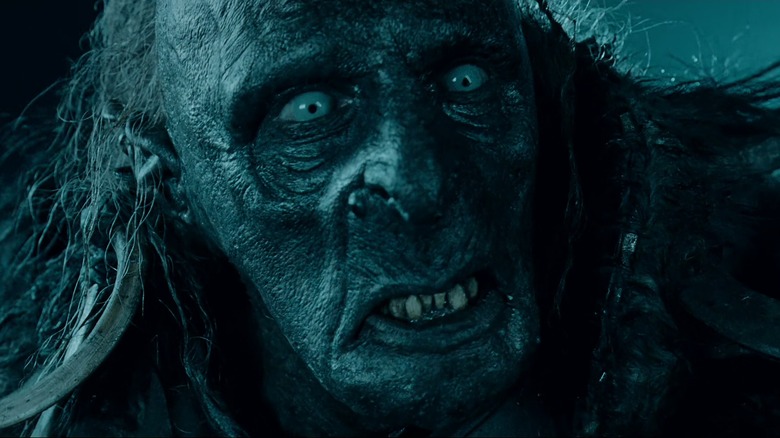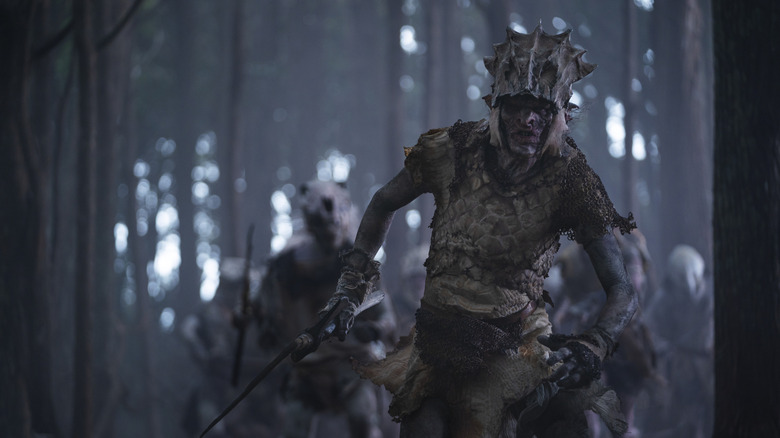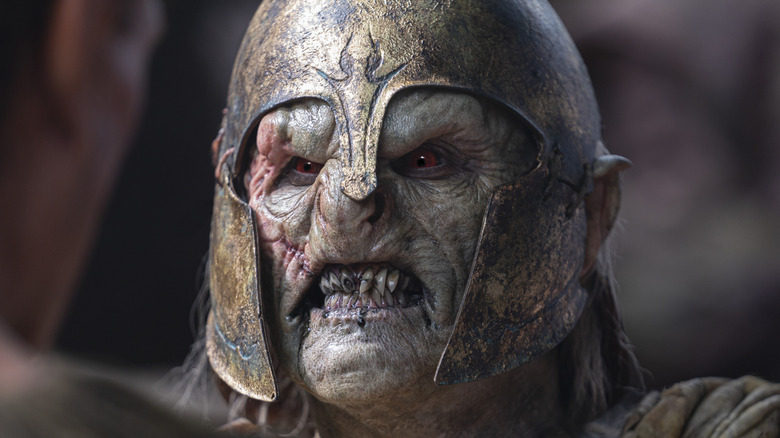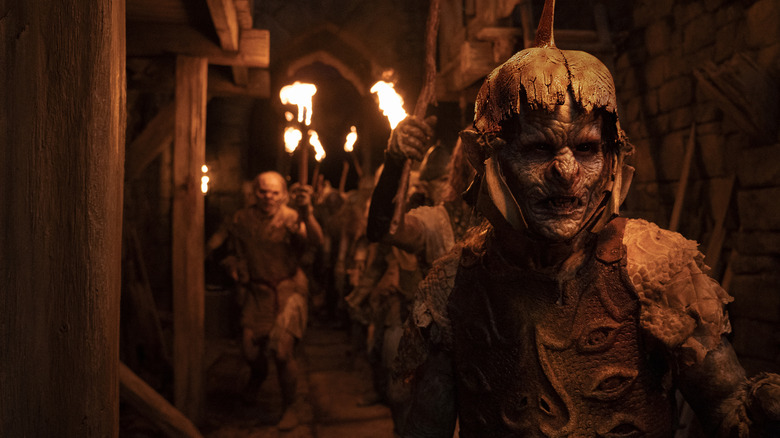Did Tolkien Think That Middle-Earth's Orcs Could Be Redeemed?
J.R.R. Tolkien spent a lot of time providing intimate details for his vast and complex world of Middle-earth. From its epic creation story and sweeping history to minute details, like where mithril comes from or how everyone is related to one another, the author always tried to connect the dots when he could. One area where he never could quite come up with a satisfactory answer, though, is with the origin and fate of Orcs — although it wasn't from lack of trying. It's a concept that troubled the Professor for his entire life and led to some very different ideas.
The inconsistent and stubbornly difficult-to-answer question of Orcish origins and fate has percolated not just through Tolkien's own works, but into countless adaptations, too. Peter Jackson's trilogy struggled to depict the creatures as little more than witless blobs of flesh that blindly followed orders and operated as the world's worst canon fodder. Prime Video's "The Lord of the Rings: The Rings of Power" has opted to go in the other direction, building a semi-relatable Orcish culture with traditions and a sense of individual value.
In either case, the root of the issue boils down to whether or not Orcs are sentient creatures with souls — and in their villainous state, souls that can be redeemed. While it's a question wide open for debate, we've scoured the source material and come up with Looper's official stance on the issue: it's highly likely that Middle-earth Orcs are ultimately redeemable. To make the statement make sense, though, we need to back up a bit and consider the progression of Orcish evolution over Tolkien's lifetime.
The wonderfully colorful world of Orcish origins
Tolkien grappled with the Orcs' origins early and often. In an early version of "The Silmarillion" called "The Book of Lost Tales," he describes them as literally being bred from stone by the Dark Lord Morgoth (called Melko here), explaining, "for all that race were bred by Melko of the subterranean heats and slime. Their hearts were of granite and their bodies deformed; foul their faces which smiled not, but their laugh that of the clash of metal, and to nothing were they more fain than to aid in the basest of the purposes of Melko."
But Tolkien wasn't happy with this puppet-like origin. He always resisted the idea that anyone could give sentient life besides the Creator, Ilúvatar. So, he began tinkering with the idea that Morgoth didn't create but rather warped existing life. This is the origin of Orcs provided in "The Silmarillion," where it connects them to the Quendi (an early name for the Elves) saying, "Yet this is held true by the wise of Eressëa, that all those of the Quendi who came into the hands of Melkor, ere Utumno was broken, were put there in prison, and by slow arts of cruelty were corrupted and enslaved; and thus did Melkor breed the hideous race of the Orcs in envy and mockery of the Elves, of whom they were afterwards the bitterest foes." The text even states, explicitly, that the Orcs have life of their own.
Other versions held that the Orcs were based on Elves rather than coming directly from them, that they were soulless animals, and that they were corrupted Men. Tolkien even clarifies that some Orcs were embodied spirits. In every case, he couldn't quite get all of the stars to align.
Orcs, bodies, and spirits
One of the biggest hang-ups with Orcish origins was Tolkien's concept of hröa (physical bodies) and fëar (souls or spirits). Together, these made up creatures like Elves, Men, and Dwarves. If Tolkien made Orcs soulless beings created from slime and stone, they couldn't make independent decisions (this is a major issue with the origin of the Dwarves, too). On the flip side, if Orcs have souls, what happens to them when they die? And ... can they be redeemed?
It's not an easy question, and as we've made abundantly clear by now, Tolkien never quite found a fully satisfactory answer. However, later in life, he did start to narrow in on some more solid concepts. In a letter to a fan in 1954, Tolkien explained that the Orcs are "fundamentally a race of 'rational incarnate' creatures, though horribly corrupted, if no more so than many Men to be met today." Later in the missive, he quotes his own story, saying "The Shadow that bred them can only mock, it cannot make real new things of its own. I don't think it gave life to the Orcs, it only ruined them and twisted them."
The book "Morgoth's Ring" goes into even more detail, adding: "Since Melkor could not 'create' an independent species, but had immense powers of corruption and distortion of those that came into his power, it is probable that these Orks had a mixed origin. Most of them plainly (and biologically) were corruptions of Elves (and probably later also of Men). But always among them (as special servants and spies of Melkor, and as leaders) there must have been numerous corrupted minor spirits who assumed similar bodily shapes. (These would exhibit terrifying and demonic characters.)"
Redeemable or irredeemable, that is the question
Okay, so without being specific or drawing conclusions, it seems that Tolkien overwhelmingly preferred the versions of Orcs that, at the very least, had sentient, rational, and independent life. They weren't puppets, and they likely had souls as well as bodies. This begs the question of whether or not they're redeemable creatures. It's a topic that is touched on in an essay included in "Morgoth's Ring" that was likely written very late in Tolkien's life.
In that text, he says, "But even before this wickedness of Morgoth was suspected the Wise in the Elder Days taught always that the Orcs were not 'made' by Melkor, and therefore were not in their origin evil. They might have become irredeemable (at least by Elves and Men), but they remained within the Law." That last bit about "the Law" refers to the need to treat Orcs with the same respect as Humans, Elves, and other sacred life. But it's earlier in the quote that we get the final answer to our question. Tolkien himself states, in one of his latest writings on Orcs, that they were not made by Melkor, nor were they evil in origin. He adds that they might have become irredeemable, but immediately clarifies that their salvation isn't likely at the hands of Elves and Men. This clearly leaves room for others to redeem them — most important, the Creator Ilúvatar himself.
It may not be a completely satisfactory answer based on concrete decision-making. Even so, there's no doubt that Tolkien grappled with the need for Orcs to have souls as well as bodies — and with them, the possibility to ultimately find grace and redemption. What that looks like in Middle-earth, though, remains a mystery.



